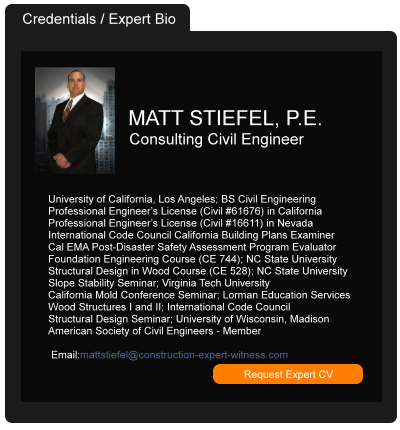Construction Contract Provisions that Should Pique Your Interest
September 30, 2019 —
Christopher G. Hill - Construction Law MusingsConstruction contracts are a big part of my legal practice and the drumbeat here at Construction Law Musings. Why? Because not only does your construction contract set the expectations and “rules of the game” for a construction project, it will be read strictly and literally by the Virginia courts should there be a dispute. For these reasons, construction professionals need to be alert for the language in certain key clauses in a construction contract to assure that these clauses are as balanced as possible and also well understood. Here are my “Top Five”:
- “Pay if Paid”- These clauses are almost always in the subcontracts between a general contractor and a subcontractor and are enforceable in Virginia if drafted correctly and under the proper circumstances.
- Change Orders- Whether work is subject to a change order and the required payment for any changed work are often a key source of contention (read legal fees). A properly drafted and followed change order provision can help avoid much of this contention.
- Indemnity- Much has been made in recent years about indemnity provisions and their enforceability. All parties in the construction payment chain can and should be aware of how to best draft their indemnity provisions to make them enforceable. Failure to do so can be catastrophic.
Read the court decisionRead the full story...Reprinted courtesy of
The Law Office of Christopher G. HillMr. Hill may be contacted at
chrisghill@constructionlawva.com
Significant Ruling in PFAS Litigation Could Impact Insurance Coverage
October 10, 2022 —
Sara C. Tilitz & Lynndon K. Groff - White and Williams LLPPer- and poly-fluoroalkyl substances, commonly known as PFAS, have served as a key component in numerous industrial and consumer products for decades. These “forever chemicals,” which have been associated with environmental contamination and adverse health outcomes, have garnered steadily-growing attention from regulatory authorities, the plaintiffs’ bar, and, by extension, the insurance industry.
The current “case to watch” regarding PFAS is the multidistrict litigation (“MDL”) in the United States District Court for the District of South Carolina, Judge Gergel presiding. The MDL is comprised of well over 2,000 cases brought by both individual plaintiffs and state and local governments arising out of the manufacturing and/or use of aqueous film forming foam, also known as AFFF. The use of AFFF, which was historically employed in firefighting operations, including those undertaken by the United States military, allegedly causes the release of two types of PFAS into the environment – PFOS and PFOA.
On September 16, 2022, Judge Gergel denied a motion for partial summary judgment filed by defendant 3M Company and other AFFF defendant manufacturers on the government contractor immunity defense. Although not an insurance coverage decision, the ruling is significant in the context of PFAS litigation and could have insurance coverage implications.
Reprinted courtesy of
Sara C. Tilitz, White and Williams LLP and
Lynndon K. Groff, White and Williams LLP
Ms. Tilitz may be contacted at tilitzs@whiteandwilliams.com
Mr. Groff may be contacted at groffl@whiteandwilliams.com
Read the court decisionRead the full story...Reprinted courtesy of
End of an Era: Los Angeles County Superior Court Closes the Personal Injury Hub
October 24, 2022 —
Elizabeth A. Evans & Angela S. Haskins - Haight Brown & Bonesteel LLPOn September 21, 2022, the Los Angeles County Superior Court announced that it would start a gradual shutdown of the Personal Injury Hub, currently located at the Spring Street Courthouse. This closure will see the return of personal injury cases being venued in the district where they occurred.
The Personal Injury Hub was established in 2012 as a means of consolidating personal injury cases after several civil courtrooms around the County were closed due to significant budget cuts. It first began as two courtrooms in Stanley Mosk Superior Court, then moved to the Spring Street Courthouse and ballooned to six courtrooms, each handling a case load of reportedly over 9,000 cases at times. Case Management Conferences were abolished and the parties were largely left to their own devices to move cases along. At times, slow chaos ensued. With a new and increased budget, Los Angeles Superior Court has now decided that enough is enough.
Effective October 10, 2022, new personal injury cases will be filed and handled from start to finish in independent calendar courtrooms in the districts where the events giving rise to the claims occurred. Any cases properly filed in the Central District will continue to be heard in the Personal Injury Hub for now. A new Civil Case Cover Sheet Addendum that reflects this change will be available on the Los Angeles County Superior Court website for use as of October 10th.
Reprinted courtesy of
Elizabeth A. Evans, Haight Brown & Bonesteel LLP and
Angela S. Haskins, Haight Brown & Bonesteel LLP
Ms. Evans may be contacted at eevans@hbblaw.com
Ms. Haskins may be contacted at ahaskins@hbblaw.com
Read the court decisionRead the full story...Reprinted courtesy of
Jason Smith and Teddie Arnold Co-Author Updated “United States – Construction” Chapter in 2024 Legal 500: Country Comparative Guides
May 28, 2024 —
Jason Smith & Edward (Teddie) Arnold - The Construction SeytJason Smith and
Teddie Arnold, partners in Seyfarth’s Washington, DC office, have co-authored an updated “United States – Construction” chapter in the 2024 edition of The Legal 500: Country Comparative Guides. Seyfarth continues to participate as an exclusive contributor for this comprehensive overview of construction-specific laws and regulations in the United States. Topics covered include, but are not limited to, requirements and obligations, permits and licencing, procurement, financing and security, and disputes, as well as insight and opinion on current challenges and opportunities. To access and download a copy of the chapter, click
here.
Reprinted courtesy of
Jason N. Smith, Seyfarth and
Edward V. Arnold, Seyfarth
Mr. Smith may be contacted at jnsmith@seyfarth.com
Mr. Arnold may be contacted at earnold@seyfarth.com
Read the full story... Read the court decisionRead the full story...Reprinted courtesy of
Latest Updates On The Coronavirus Pandemic
March 30, 2020 —
ENR Editors - Engineering News-RecordCoronavirus has struck a heavy blow against the world economy as it forces countries into lockdown with "closed for business" signs, hollows out the tourism, travel and hospitality sectors, turns out the lights on business gatherings and events, sends employees home to work and drives the stock market into a dizzying tumble.
ENR Editors
ENR may be contacted at ENR.com@bnpmedia.com
Read the full story for ENR's ongoing reporting, analysis and commentary on construction sector developments
Read the court decisionRead the full story...Reprinted courtesy of
NTSB Outlines Pittsburgh Bridge Structure Specifics, Finding Collapse Cause Will Take Months
February 21, 2022 —
Tom Ichniowski - Engineering News-RecordOfficials in Pennsylvania are moving forward on building a replacement for the Fern Hollow Bridge in Pittsburgh, which collapsed on Jan. 28, selecting a team of HDR Inc. and Swank Construction to design and construct the new structure, and the approval of $25.3 million in federal funds for the project.
Reprinted courtesy of
Tom Ichniowski, Engineering News-Record
Mr. Ichniowski may be contacted at ichniowskit@enr.com
Read the full story... Read the court decisionRead the full story...Reprinted courtesy of
Newmeyer & Dillion Partner Aaron Lovaas & Casey Quinn Recognized by Super Lawyers
July 21, 2018 —
Newmeyer & DillionLAS VEGAS, Nev. – JUNE 11, 2018 – Prominent business and real estate law firm Newmeyer & Dillion LLP is pleased to announce that partner
Aaron Lovaas has been selected to the 2018 Mountain States Super Lawyers list, and associate
Casey Quinn has been selected to the 2018 Mountain States Rising Stars list by Super Lawyers. Each year, no more than 5 percent of lawyers are named to a Super Lawyers list and less than 2.5 percent are named to the Rising Stars list. This is the 9th consecutive year Lovaas has been honored, while Quinn has been consistently selected as a Rising Star honoree in prior years.
Aaron Lovaas is a partner in the Las Vegas office. As a transactional attorney and business litigator, Lovaas has the ability to evaluate legal issues from both points of view and help his clients understand their best option. He also brings to the table experience as a business owner, having owned and managed his own boutique law firm for 12 years.
Casey Quinn, an associate in the Las Vegas office, focuses his practice in complex commercial and construction litigation. He represents a variety of business entities in commercial disputes, including contract claims, business torts, privacy lawsuits, defamation, and fraud. Quinn is a past chair of the Construction Law section of the State Bar of Nevada and has successfully argued before the Supreme Court of Nevada, as well as settled disputes through various forms of conflict resolution including mediation and arbitration.
Super Lawyers is a rating service of outstanding lawyers from more than 70 practice areas who have attained a high-degree of peer recognition and professional achievement. The patented selection process includes independent research, peer nominations and peer evaluations.
About Newmeyer & Dillion
For more than 30 years, Newmeyer & Dillion has delivered creative and outstanding legal solutions and trial results for a wide array of clients. With over 70 attorneys practicing in all aspects of business, employment, real estate, construction and insurance law, Newmeyer & Dillion delivers legal services tailored to meet each client's needs. Headquartered in Newport Beach, California, with offices in Walnut Creek, California and Las Vegas, Nevada, Newmeyer & Dillion attorneys are recognized by The Best Lawyers in America©, and Super Lawyers as top tier and some of the best lawyers in California, and have been given Martindale-Hubbell Peer Review's AV Preeminent® highest rating. For additional information, call 949.854.7000 or visit www.ndlf.com.
Read the court decisionRead the full story...Reprinted courtesy of
Force Majeure Under the Coronavirus (COVID-19) Pandemic
March 29, 2021 —
Lindsay T. Watkins - Ahlers Cressman & Sleight PLLCAs COVID-19 disrupts work and life as we know it, the question many contractors have is what protections are available against the inevitable project impacts and delays? Generally, construction contracts require a contractor to timely perform work until project completion or potentially face damages (liquidated or actual) and possible termination. When events occur, however, that are beyond our control (such as a national pandemic), it is important to review and understand what contract provisions or avenues are available for potential relief.
- Review Your Contract For A Force Majeure Provision.
A “force majeure” contract provision is commonly included in construction contracts, service agreements, purchase orders, etc. It typically covers events or conditions that can be neither anticipated nor controlled. These provisions, however, will vary greatly from contract to contract and may not include the language “force majeure” but rather may be included in general delay or impact clauses. For example, some common provisions include:
- Washington State Department of Transportation Clause (2018 Standard Specifications for Road, Bridge and Municipal Construction): The Contractor shall rebuild, repair, restore, and make good all damages to any portion of the permanent or temporary Work occurring before the Physical Completion Date and shall bear all the expense to do so, except damage to the permanent Work caused by: (a) acts of God, such as earthquake, floods, or other cataclysmic phenomenon of nature, or (b) acts of the public enemy or of governmental authorities; or (c) slides in cases where Section 2-03.3(11) is applicable; Provided, however, that these exceptions shall not apply should damages result from the Contractor’s failure to take reasonable precautions or to exercise sound engineering and construction practices in conducting the Work.
Read the court decisionRead the full story...Reprinted courtesy of
Lindsay T. Watkins, Ahlers Cressman & Sleight PLLCMs. Watkins may be contacted at
Lindsay.Watkins@acslawyers.com


































































